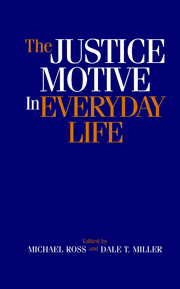Book contents
- Frontmatter
- Contents
- List of Contributors
- Introduction
- Theoretical Perspectives on the Justice Motive
- Victim Derogation and the Belief in a Just World
- The Justice Motive and Prosocial Behavior
- Justice-Based Reactions to Transgressors
- Justice and Reaction to One's Own Fate
- 20 Belief in a Just World as personal Resource in School
- 21 Awaking to Discrimination
- 22 Deservingness and Perceptions of Procedural Justice in Citizen Encounters with the Police
- 23 Fairness Judgements as Cognitions
- Name Index
- Subject Index
22 - Deservingness and Perceptions of Procedural Justice in Citizen Encounters with the Police
Published online by Cambridge University Press: 08 September 2009
- Frontmatter
- Contents
- List of Contributors
- Introduction
- Theoretical Perspectives on the Justice Motive
- Victim Derogation and the Belief in a Just World
- The Justice Motive and Prosocial Behavior
- Justice-Based Reactions to Transgressors
- Justice and Reaction to One's Own Fate
- 20 Belief in a Just World as personal Resource in School
- 21 Awaking to Discrimination
- 22 Deservingness and Perceptions of Procedural Justice in Citizen Encounters with the Police
- 23 Fairness Judgements as Cognitions
- Name Index
- Subject Index
Summary
Distributive justice theories (e.g., relative deprivation, equity, justice motive theory) have consistently postulated that disputants' satisfaction with the outcomes of social conflicts is influenced by the extent to which allocations are consistent with salient standards of deservingness or entitlement. So, for example, relative deprivation theorists (e.g., Crosby, 1976; Davis, 1959; Gurr, 1970; Runciman, 1966) have shown that feelings of indignation or outrage stemming from deprivation are moderated by notions of entitlement. They have revealed that judgments about what individuals feel they deserve are based on comparisons with what others within their group or within a similar context have received rather than on absolute outcomes. This theory explains why those in an objectively positive situation can evaluate their situation negatively, and why those in a seemingly poor situation can view their situation optimistically. Crosby's (1982) study of working women identified two preconditions essential for relative deprivation – lesser outcomes than one wants, and lesser outcomes than one deserves. Similarly, equity theorists (Adams, 1965; Homans, 1961; Walster, Berscheid, & Walster, 1976) assume that an individual's sense of equity acts as a powerful norm influencing social behavior. This norm is comprised of the belief that outcomes, both positive and negative, should be proportional to one's contribution and involvement within the group. When an inequitable distribution of outcomes is perceived, it is argued that individuals will experience “inequity distress.” It is theorized that the dissonance this perception creates will motivate the individual to restore equity.
- Type
- Chapter
- Information
- The Justice Motive in Everyday Life , pp. 397 - 415Publisher: Cambridge University PressPrint publication year: 2002
- 14
- Cited by

